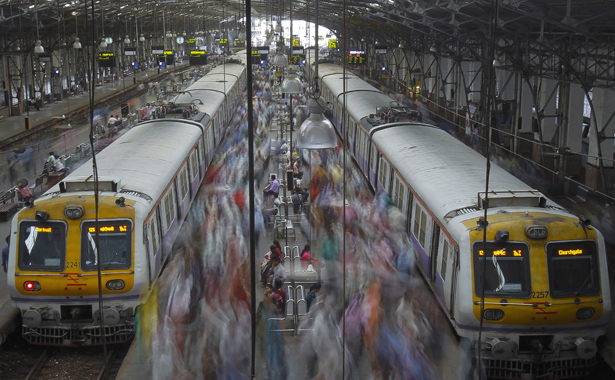
 |
| Morning rush hour in Mumbai's Churchgate railway station on July 11th, 2012. (Vivek Prakash/Reuters) |
Eurasia declined, and the report sees "danger signs for new democracies," including South Africa and Turkey. Asia, though, experienced a moderate rise in freedom. Overall, there are 87 "free" countries and 60 "partly free" countries, both equal to last year. Forty-eight countries are "not free," an increase of 1 because of South Sudan's independence. Niger, Thailand, and Tunisia joined the ranks of electoral democracies. Nicaragua dropped off.
Transformation: The Bertelsmann Stiftung's Transformation Status Index gauges where developing countries stand "on the path toward democracy under the rule of law and a market economy anchored in principles of social justice." The Czech Republic, Taiwan, Slovenia, Uruguay, and Estonia take this year's top spots; Somalia, Myanmar, Eritrea, North Korea, and Afghanistan are at the bottom. Among the largest developing powers, Brazil finishes 18th, Turkey 20th, India 24th, South Africa 26th, Mexico 35th, Russia 60th, and China 84th.
Economic Freedom: After an optimistic report last year, the Heritage Foundation Index of Economic Freedom was more downcast in 2012. The global average score dropped slightly, with 90 countries declining and 75 improving. A major factor in the overall slide is government spending, "which has led to rising levels of public debt and economic stagnation," the index says. Rule of law scores also slipped.
However, of the 75 countries making gains, "73 are considered developing or emerging." Chile finished 7th, regaining the top-ten spot it lost in 2009. Mauritius took 8th, the highest-ever score for sub-Saharan Africa.
Competitiveness: The World Economic Forum's (WEF) Global Competitiveness Index exhibits some marked regional divides. Asia has a yawning gap between dynamic "regional champions," such as Singapore, Hong Kong, and Japan, and countries such as Bangladesh, Pakistan, and Nepal that are "lagging further and further behind."
Chile held steady as Latin America's competitiveness leader and Panama, Brazil, Mexico, and Peru made gains. But Uruguay and Argentina took steep falls and Venezuela a smaller one. In the Middle East, Qatar and the UAE improved their competitiveness; Saudi Arabia and Israel lost ground but remain fairly highly ranked. Jordan achieved strong gains but only to 64th overall, and Egypt plummeted 13 spots to 107th. Finally, Africa continues to trail the rest of the world; its highest-ranked country, South Africa, is only 52nd in the index. Rwanda, Ghana, and Nigeria gained ground while Namibia slid.
Doing Business: This year's World Bank Doing Business rankings, which gauge countries' business climates, look back at the decade since the rankings first appeared. "Eastern Europe and Central Asia improved the most," the report says, now trailing only "OECD high-income economies" in their business friendliness. And of the 50 most improved countries since 2005, "the largest share--a third--are in Sub-Saharan Africa."
However, that region continues to dominate the bottom ranks; 16 of the last 20 countries this year are African. Poland, Sri Lanka, Ukraine, Uzbekistan, and Burundi showed the biggest improvements in 2012, while Georgia made its first entry into the top 10.
Corruption Perceptions: The results of Transparency International's well-known index are largely unsurprising. In the Americas (which are ranked together), Canada, Barbados, and the United States are seen as the cleanest countries, with Chile and Uruguay tied for 4th. Haiti and Venezuela are last. New Zealand, Singapore, and Australia are tops in Asia and the Pacific; Bhutan scores a strong 6th. Meanwhile, Afghanistan and North Korea tie for last in the region and, with Somalia, for last overall. In the Middle East, Qatar and the UAE tie for the highest score, followed by Israel, Bahrain, and Jordan. Iraq, Libya, and Yemen are seen as most corrupt. Finally, Botswana, Cape Verde, Mauritius, Rwanda, and the Seychelles do best in sub-Saharan Africa. Somalia, Sudan, Chad, Burundi, and Zimbabwe finish last.
Prosperity: The Legatum Institute's 2012 Prosperity Index, which measures a range of economic, political, and social indicators, offers some hopeful trends. Prosperity has increased in every region over the past 4 years, it says. Central Asia, Southeast Asia, and sub-Saharan Africa have made the biggest gains. Overall, Asia is home to 6 of the top 15 countries in this year's index. Indonesia "has experienced the largest increase in prosperity, globally, since 2009, moving up 26 positions to 63nd." This year, Norway, Denmark, Sweden, Australia, and New Zealand lead the index, while the Central African Republic, Republic of the Congo, Afghanistan, Chad, and Haiti come in last. The United States ranks 12th, missing the top 10 for the first time.
No comments:
Post a Comment